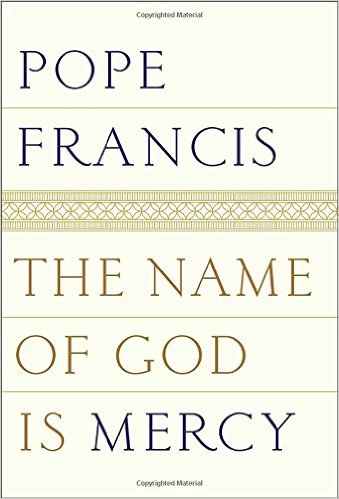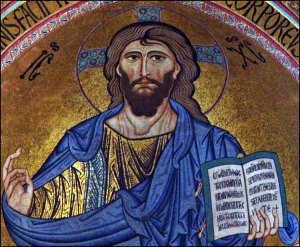
—
Saint Andrew watches over many Christian institutions. These include: our beloved parish here in Roanoke, Virginia, and the nation of Russia, among many others. Today we keep the saint’s feast.
 At the beginning of his letter closing the Year of Mercy, Pope Francis invokes the memory of St. Mary Magdalene. Actually, the pope recalls two women: the woman caught in adultery, and the woman who bathed the feet of Christ with her hair. But, according to tradition, and according to the great 20th-century Russian poet and novelist Boris Pasternak, those women are one woman, namely Mary Magdalene.
At the beginning of his letter closing the Year of Mercy, Pope Francis invokes the memory of St. Mary Magdalene. Actually, the pope recalls two women: the woman caught in adultery, and the woman who bathed the feet of Christ with her hair. But, according to tradition, and according to the great 20th-century Russian poet and novelist Boris Pasternak, those women are one woman, namely Mary Magdalene.
—
Mary Magdalen by Boris Pasternak (translation by his sister Lydia Pasternak Slater)
I
As soon as night descends, we meet.
Remorse my memories releases.
The demons of the past compete,
And draw and tear my heart to pieces,
Sin, vice and madness and deceit,
When I was slave of men’s caprices
And when my dwelling was the street.
The deathly silence is not far;
A few more moments only matter,
Which the Inevitable bar.
But at the edge, before they scatter,
In front of Thee my life I shatter,
As though an alabaster jar.
O what might not have been my fate
By now, my Teacher and my Savior,
Did not eternity await
Me at the table, as a late
New victim of my past behavior!
But what can sin now mean to me,
And death, and hell, and sulphur burning,
When, like a graft onto a tree,
I have-for everyone to see-
Grown into being part of Thee
In my immeasurable yearning?
When pressed against my knees I place
Thy precious feet, and weep, despairing,
Perhaps I’m learning to embrace
The cross’s rough four-sided face;
And, fainting, all my being sways
Towards Thee, Thy burial preparing.
II
People clean their homes before the feast.
Stepping from the bustle of the street
I go down before Thee on my knees
And anoint with myrrh Thy holy feet.
Groping round, I cannot find the shoes
For the tears that well up with my sighs.
My impatient tresses, breaking loose,
Like a pall hang thick before my eyes.
I take up Thy feet onto my lap,
Wash them clean with hot tears from my eyes,
In my hair Thy precious feet I wrap,
And my string of pearls around them tie.
I now see the future in detail,
As if it were stopped in flight by Thee.
Like a raving sibyl, I could tell
What will happen, how it will all be.
In the temple, veils will fall tomorrow,
We shall form a frightened group apart,
And the earth will shake-perhaps from sorrow
And from pity for my tortured heart.
Troops will then reform and march away
To the thud of hoofs and heavy tread,
And the cross will reach towards the sky
Like a water-spout above our heads.
By the cross, I’ll fall down on the ground,
I shall bite my lips till I draw blood.
On the cross, your arms will be spread out–
Wide enough to hug the whole wide world.
Who’s this for, this glory and this strife?
Who’s this for, this torment and this might?
Are there enough souls on earth, and lives?
Are there enough cities, dales and heights?
But three days–such days and nights will pass–
They will fill me with such crushing dread
That I’ll see the joyous truth, at last:
I shall know Christ will rise from the dead.
—
Mary Magdalene is one of Pasternak’s “Zhivago Poems,” that is, the poem is included in the novel as the work of the fictional hero.
I read Pasternak’s Dr. Zhivago because Thomas Merton thoroughly recommends it in his book Disputed Questions. Many people love the picturesque movie version of Dr. Zhivago, with Omar Sharif. If you want to continue to love the movie, don’t read the novel. The movie becomes laughable once you’ve read the six hundred pages of prose-poetry that Hollywood managed to turn into a lugubrious comic book.
Prose poetry like Lara’s description of the love she shared with her Yura (the doctor of the title), as she reflects after his death:
They loved each other because everything around them willed it, the trees and the clouds and the sky over their heads and the earth under their feet. Perhaps their surrounding world, the strangers they met in the street, the wide expanses they saw on their walks, the rooms in which they lived or met, took more delight in their love than they themselves did.
Ah, that was just what had united them and had made them so akin! Never, never, even in their moments of richest and wildest happiness, were they unaware of a sublime joy in the total design of the universe, a feeling that they themselves were a part of that whole, an element in the beauty of the cosmos.
This unity with the whole was the breath of life to them. And the elevation of man above the rest of nature, the modern coddling and worshiping of man, never appealed to them. A social system based on such a false premise, as well as its political application, struck them as pathetically amateurish and made no sense to them.
Much more to come re: Pasternak and Zhivago, dear reader. In fact, I want to offer you a different translation of Mary Magdalene, which I can’t dig up just now, but which I think is actually better than his sister’s translation–which, to my mind, sacrifices too much for the sake of retaining the rhyme scheme. Just wanted to share this much with you in honor of our parish’s patron today.
 The non-Catholic school of thought revolves around the idea that the salvation of my soul ultimately turns on my act of faith in Christ my Savior, my Redeemer. Hence the question, “Are you saved?” And the answer, “Yes! Because I confessed Christ as my Savior, Redeemer and Lord!”
The non-Catholic school of thought revolves around the idea that the salvation of my soul ultimately turns on my act of faith in Christ my Savior, my Redeemer. Hence the question, “Are you saved?” And the answer, “Yes! Because I confessed Christ as my Savior, Redeemer and Lord!” To answer this question, let’s consider this: One image appears repeatedly in the
To answer this question, let’s consider this: One image appears repeatedly in the  But the little baby of Bethlehem comes to dig into us, into the little mud-huts of our souls, and steal every self-aggrandizing delusion out of our egos. When I contemplate the Prince of Peace, laid in an animals’ manger; when I reflect that this is God Almighty–my sense of my bigshot self has to go out the window.
But the little baby of Bethlehem comes to dig into us, into the little mud-huts of our souls, and steal every self-aggrandizing delusion out of our egos. When I contemplate the Prince of Peace, laid in an animals’ manger; when I reflect that this is God Almighty–my sense of my bigshot self has to go out the window. The Holy Bible contains the account of the righteous deeds of Almighty God, the work He has undertaken in the course of history. His works make our lives mean something; what He has accomplished gives us hope for eternal life.
The Holy Bible contains the account of the righteous deeds of Almighty God, the work He has undertaken in the course of history. His works make our lives mean something; what He has accomplished gives us hope for eternal life.

 But the revelation of Daniel 2 does not completely disclose the kingdom of Christ. One crucial aspect of the eternal kingdom only got revealed later, when the fullness of time had come.
But the revelation of Daniel 2 does not completely disclose the kingdom of Christ. One crucial aspect of the eternal kingdom only got revealed later, when the fullness of time had come.

 Right. Commandments. We have a lot of friends in this life. But none of them help us more than our dear friends, the Ten Commandments.
Right. Commandments. We have a lot of friends in this life. But none of them help us more than our dear friends, the Ten Commandments. The heavenly voice told St. John to write: “I advise you to buy from me white garments to put on, so that your shameful nakedness may not be exposed.” (Revelation 3:18)
The heavenly voice told St. John to write: “I advise you to buy from me white garments to put on, so that your shameful nakedness may not be exposed.” (Revelation 3:18)
 We fear Him. But, in spite of all this, He makes amazingly friendly and intimate promises to us. “Fear nothing,” He says, “because I myself will give you wisdom.”
We fear Him. But, in spite of all this, He makes amazingly friendly and intimate promises to us. “Fear nothing,” He says, “because I myself will give you wisdom.” Now, we Americans have elected as our president a man who, by any reasonable estimation, is simply not a good person. I don’t mean that, had the outcome on Tuesday been different, we would then have elected a good person. I’m not saying that. But that’s all moot now anyway.
Now, we Americans have elected as our president a man who, by any reasonable estimation, is simply not a good person. I don’t mean that, had the outcome on Tuesday been different, we would then have elected a good person. I’m not saying that. But that’s all moot now anyway. He came suddenly the first time. At least it seemed sudden to most people.
He came suddenly the first time. At least it seemed sudden to most people.